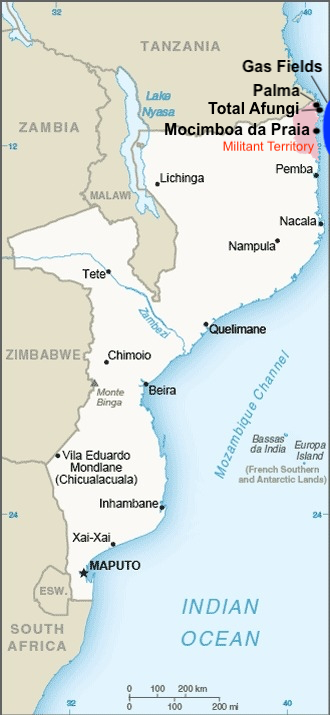|
Today's Opinions, Tomorrow's Reality
Dirty Business By David G. Young Washington, DC, April 6, 2021 -- The discovery of natural gas off the north coast of Mozambique has done nothing to lessen the region's misery. Wen a violent attack on Mozambique's northern town of Palma made news last week, early accounts didn't tell the full truth. Initial reports focussed on a group of foreigners from Europe and South Africa under siege at the Amarula Palma hotel fearing for their lives. Several people were killed leaving the hotel to join a vehicle convoy fleeing the area.1 Aid workers aside, most of the foreigners were in this lawless region due to the huge liquified natural gas facility being built by French petroleum giant Total on the Afungi peninsula a few miles south of town. Without the easy money offered by a new petroleum boom, there was precious little reason to come to the area.
Yesterday, Mozambique's government claimed to have secured the town from the islamic militants who had invaded two weeks earlier. 1200 people were evacuated last week buy ferry to Pemba, the capital of Cabo Delgado province. But the story is far from over.2 The Islamist militants who attacked Palma still control huge areas of Mozambique's Cabo Delgado province starting just south of the liberated town. Their territory stretches down almost the entire coast of the province, from just south of Palma by the Tazanian border nearly all the way to the provincial capital of Pemba 100 miles away. This includes the port city of Mocimboa da Praia, home to over 100,000 people -- perhaps the largest city under Islamist control since the liberation of Mosul and Raqqa during the campaign against the Islamic State. Lawlessness and neglect is nothing new to this region. The Portuguese took over a string of Arab coastal fortifications 500 years ago but otherwise paid little attention to the hinterlands they claimed. When then Marxist Frelimo rebels began the insurgency against Portugal in 1964, they entered Mozambique from this same isolated northern region. But when the rebel leaders won the war to evict the Portuguese, they happily settled in graceful urban villas in the nation's capital city of Maputo on the far opposite end of the country -- over 1,200 miles to the south. Independent Mozambique's ruling class, like the Portuguese and Arabs before them, found little of interest in the north. That only started to change a decade ago, with the discovery of vast natural gas reserves just offshore. These deposits, combined with new technology and systems for liquifying natural gas and shipping it to markets around the world, turned this area from a well-established backwater to a veritable gold mine. The last few years has seen Total construct a large compound just south of Palma with its own airport, housing, power generation and water treatment. The plan was for this industrial facility to expand into a huge liquified natural gas processing plant and export terminal. But the sketchy security situation of this long lawless region always made that plan questionable. Militant loyalties in the region have shifted over the decades -- the Marxist Frelimo rebels have way to anti-Marxist Renamo rebels which gave way to profiteering warlords and more recently islamist militants. Apartheid-era South African special forces gave way to South African mercenaries -- mercenaries who are still in the region. For the past year, the South-African based Dyck Advisory Group has used helicopter gunships to protect the town and petroleum facilities from militants, but the Mozambican military refused to renew the mercenaries' contract in the weeks leading up to the attack on Palma. After the recent attacks, Total has evacuated its workers and left its facilities under the control of the weak Mozambican military, in which the company clearly has little faith.3 Total had only months earlier suspended work due to the militant threat before the military promised to create a secure zone surrounding the facility. The fate of Total, the mercenaries, the Mozambican military and the militants are intricately intertwined. It's unclear exactly how the competing interests of these groups and their dirty business ventures interacted to result in the attack on Palma. What is clear is that for hundreds of thousands of Mozambicans living in the areas of Cabo Delgado province still under islamist rule, life has not changed since the liberation of Palma. The occupied region hosts few foreigners and includes no natural gas facilities. As a result, don't expect their plight to get attention from the international press any time soon. Notes: 1. BBC News, Mozambique insurgency: Islamist Militants 'Ambush Workers Fleeing Hotel', March 27, 2021 2. SABC News, Mozambique Government Secures Palma After Bloody Attack, April 6, 2021 3. Daily Maverick, Total Decides on Total Recall of All Staff From Troubled Afungi Gas Project, April 2, 2021 |


